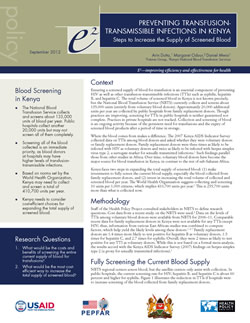The Health Policy Project ended in 2016. Work continued under Health Policy Plus (HP+) until 2022.
PUBLICATION
Author(s): Arin Dutta, Margaret Odour, and Daniel Mwai
Primary Language: English
Date: 9/28/2012
Abstract:
HIV, hepatitis A, hepatitis C, and syphilis are all transfusion-transmissible infections that can arise from the use of unscreened blood. In collaboration with Kenya's National Blood Transfusion Services (NBTS), the Health Policy Project examined the current status of blood screening in Kenya and two key steps that could help reduce the risk of transmissible infections. Relevant research questions revealed that Kenya, like other sub-Saharan African countries, needs to completely screen, in both facilities and donation centers, the blood of all family replacement donors as well as voluntary donors. It also needs to increase the total supply of screened blood to meet the needs of a growing population. This brief summarizes the analysis conducted, presents the cost-benefit results of completely screening the existing blood supply (in terms of infections averted), and outlines cost-efficient steps for increasing the total screened blood supply.
Health Financing HIV Modeling Working Papers Kenya


